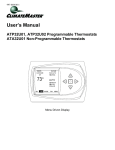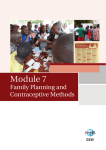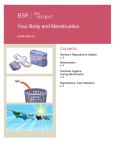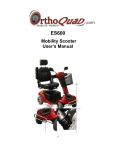Download A guide for those considering birth control with Mirena®
Transcript
FDA approved to treat heavy periods in women who choose intrauterine contraception. mirena-us.com Model used for illustrative purposes only. A guide for those considering birth control with Mirena® INDICATIONS & USAGE Mirena® (levonorgestrel-releasing intrauterine system) is a hormone-releasing system placed in your uterus to prevent pregnancy for as long as you want for up to 5 years. Mirena also treats heavy periods in women who choose intrauterine contraception. IMPORTANT SAFETY INFORMATION ABOUT MIRENA Only you and your healthcare provider can decide if Mirena is right for you. Mirena is recommended for women who have had a child. • Don’t use Mirena if you have a pelvic infection, get infections easily or have certain cancers. Less than 1% of users get a serious infection called pelvic inflammatory disease. If you have persistent pelvic or abdominal pain, see your healthcare provider. • Mirena may attach to or go through the wall of the uterus and cause other problems. If Mirena comes out, use back-up birth control and call your healthcare provider. • Although uncommon, pregnancy while using Mirena can be life threatening and may result in loss of pregnancy or fertility. • Ovarian cysts may occur and usually disappear. • Bleeding and spotting may increase in the first few months and continue to be irregular. Periods over time may become shorter, lighter or even stop. Mirena does not protect against HIV or STDs. Because you’re busy, you need birth control that helps simplify your life.l. Consider Mirena. • Mirena is a small intrauterine contraceptive made of soft, flexible plastic that is put in place by your healthcare provider during an office visit • Mirena is one of the most effective forms of birth control available in the United States— over 99% effective1 • Mirena prevents pregnancy for as long as you want, for up to 5 years • Mirena can be removed by your healthcare provider before the 5-year period if you want to try to get pregnant, or for any other reason. You may become pregnant as soon as Mirena is removed • Mirena is currently used by nearly 2 million women in the United States Considering Mirena to treat heavy periods? • In a clinical trial of women with heavy periods and treated with Mirena, the majority had an 80% reduction in bleeding as early as 3 months. At 6 months, the majority had over a 90% reduction in bleeding You are encouraged to report negative side effects of prescription drugs to the FDA. Visit www.fda.gov/medwatch, or call 1-800-FDA-1088. 2 For additional Important Safety Information about Mirena please see page 16 of this booklet and click here for the Full Prescribing Information. Models used for illustrative purposes only. For more information, visit mirena-us.com or call 1-888-84-BAYER 3 Contents What Is Mirena®? . .............................................. 6 Family Planning Options ................................. 10 Safety Information About Mirena................... 16 Keeping Life Simple ......................................... 28 Affording Mirena .............................................. 30 Mirena Support.................................................. 32 Talk With Your Healthcare Provider.............. 34 Only you and your healthcare provider can decide if Mirena (levonorgestrel-releasing intrauterine system) is right for you. Mirena is recommended for women who have had a child. on’t use Mirena if you have a pelvic infection, get D infections easily or have certain cancers. Less than 1% of users get a serious infection called pelvic inflammatory disease. If you have persistent pelvic or abdominal pain, see your healthcare provider. For additional Important Safety Information about Mirena please see page 2 and page 16 of this booklet and click here for the Full Prescribing Information. 4 Models used for illustrative purposes only. 5 Birth Control That’s Over 99% Effective. Mirena® prevents pregnancy for as long as you want, for up to 5 years. There are many things to consider before starting any birth control method. If you’re considering Mirena (levonorgestrel-releasing intrauterine system), this booklet may answer many of the questions you have. Use it as a guide to discuss Mirena with your healthcare provider. Only you and your healthcare provider can decide if Mirena is right for you. Q: What is Mirena? A:Mirena is an intrauterine contraceptive that delivers small amounts of hormone into the uterus. Made of soft, flexible plastic, it is put in place by your healthcare provider during an office visit. Plus: • Mirena offers contraception that’s over 99% effective; in fact, it is one of the most effective methods of birth control1 • Mirena prevents pregnancy for as long as you want, for up to 5 years • You may become pregnant as soon as Mirena is removed by your healthcare provider Q: Where is Mirena placed? A:Mirena is placed inside the uterus, not in the vagina. Mirena delivers the hormone levonorgestrel locally into the uterus. This is why it is referred to as an intrauterine system. Q: When should Mirena be placed? A:Mirena should be placed within 7 days of the start of your period. Q: What do I need to do once Mirena is placed? A:Once Mirena is placed by your healthcare provider, he or she will ask you to come back for a follow up visit within 4-12 weeks. Be sure to check the threads of Mirena once a month, and continue with your annual visits. Call your healthcare provider if you have any questions. Q: What about Mirena and infections? A:Don’t use Mirena if you have a pelvic infection or get infections easily. Less than 1% of users get a serious infection called pelvic inflammatory disease. If you have persistent pelvic or abdominal pain, see your healthcare provider. mirena-us.com For additional Important Safety Information about Mirena please see page 2 and page 16 of this booklet and click here for the Full Prescribing Information. 6 7 Birth Control That’s Over 99% Effective. Q: How does Mirena® work to prevent pregnancy? A:Mirena (levonorgestrel-releasing intrauterine system) releases small amounts of the hormone levonorgestrel into your uterus. Mirena may work in several different ways. It may: • Thicken cervical mucus to prevent sperm from entering your uterus • Inhibit sperm from reaching or fertilizing your egg • Make the lining of your uterus thin Mirena may stop the release of your egg from your ovary, but this is not the way it works in most cases. Most likely the above actions work together to prevent pregnancy. Like other forms of birth control, Mirena is not 100% effective. Q: What about the hormone in Mirena? A:Mirena contains a progestin hormone called levonorgestrel that is often used in birth control pills. Mirena does not contain estrogen. Mirena releases the hormone into your uterus. Only small amounts of the hormone enter your blood. Q: How effective is Mirena? A:Mirena is one of the most effective methods of birth control.1 Over the course of 5 years, fewer than 8 in 1,000 women become pregnant while using Mirena.* It doesn’t rely on your using it regularly to be effective. Once Mirena is placed in your uterus by your healthcare provider, it is over 99% effective throughout the time you choose to keep Mirena, for up to 5 years.1 Q: Are there any placement-related complications? A:Mirena may attach to or go through the wall of the uterus and cause other problems. If Mirena comes out, use backup birth control and call your healthcare provider. Q: What are the threads attached to Mirena? A:Two threads are attached to the stem of Mirena that help ensure Mirena remains properly placed. They are the only part of Mirena you should feel when it is in your uterus, and you should check them once a month. Your healthcare provider can show you how. If you feel more than just the threads, Mirena is not in the right position and may not prevent pregnancy. If you can’t find the threads, use a backup form of birth control and contact your healthcare provider. *See chart on page 13 for the effectiveness of some common birth control methods. mirena-us.com For additional Important Safety Information about Mirena please see page 2 and page 16 of this booklet and click here for the Full Prescribing Information. 8 9 Keeping Your Options Open. When it comes to family planning, Mirena® gives you the flexibility you want. Q: How can Mirena help with family planning decisions? A:With Mirena (levonorgestrel-releasing intrauterine system), you get effective protection and flexibility. Especially since you can have it removed by your healthcare provider as soon as you want to try to have another baby. You may become pregnant as soon as Mirena is removed. In fact, within a year of having Mirena removed, approximately 8 out of 10 women succeed at becoming pregnant. Q: What happens if I do get pregnant while using Mirena? A:In the uncommon event you get pregnant while using Mirena, seek emergency care because pregnancy with an intrauterine device can be life threatening and may result in loss of pregnancy or fertility. Q: Who is Mirena right for? A:Mirena is recommended for women who have had at least one child. This is because most of the medical research conducted on Mirena for FDA approval was among women who had at least one child. Only you and your healthcare provider can decide if Mirena is right for you (see page 16, “Who should not use Mirena?”). Whatever stage of reproductive life you’re in, Mirena offers a flexible option if: • You want birth control you don’t have to think about taking every day • You had a baby and want to explore your birth control options • You want to have more children • You are happy with your family size the way it is • You are unsure if you want more children • You want birth control that is also approved to treat heavy periods Q: How soon after I give birth can I get Mirena? A:Mirena should not be placed earlier than 6 weeks after you give birth or as directed by your healthcare provider. When you ask your healthcare provider about Mirena, be sure to tell him or her if you recently had a baby or are breastfeeding and plan to continue breastfeeding after getting Mirena placed. Q:What if I haven’t decided whether or not I want more children? A:Then Mirena is a good choice because it prevents pregnancy for as long as you want, for up to 5 years. As far as family planning goes, this can be especially appealing if you are undecided about whether you want more children. Should you decide you do want to try to get pregnant, Mirena can be removed at any time by your healthcare provider. Or, if at the end of the 5-year period you’re still undecided, you can have another Mirena placed. For additional Important Safety Information about Mirena please see page 2 and page 16 of this booklet and click here for the Full Prescribing Information. 10 Models used for illustrative purposes only. 11 Mirena is one of the most effective forms of contraception. Keeping Your Options Open. Q: What if I decide I want to try to get pregnant? A:Mirena® (levonorgestrel-releasing intrauterine system) prevents pregnancy for as long as you want, for up to 5 years. When you decide you want to try to have another child, Mirena can be removed by your healthcare provider at any time. It typically takes just a few minutes during an office visit. You may become pregnant as soon as Mirena is removed. 1 Most effective Fewer than 1 Q:How well does Mirena work at preventing pregnancy? A:Once Mirena is placed by your healthcare provider, it is over 99% effective and works consistently to prevent pregnancy.1 So you don’t have to think about taking birth control every day, or even every year. Once Mirena is placed, check your threads once a month. Your healthcare provider can show you how. If you have trouble finding the threads, call your healthcare provider right away. And in the meantime, use a backup form of birth control. It is important to think about your daily, weekly and monthly routine and how that may affect which birth control method is best for you. The adjacent chart shows the chances of getting pregnant for women who use different methods of birth control. The most effective methods, including intrauterine devices such as Mirena, are found at the top of the chart. If you have any questions about this information, please ask your healthcare provider. 10-20 Pregnancies per 100 women in 1 year Q: What happens if my Mirena comes out? A:If Mirena comes out, do not try to reinsert it. Contact your healthcare provider and be sure to use a backup form of birth control. 85 or more For additional Important Safety Information about Mirena please see page 2 and page 16 of this booklet and click here for the Full Prescribing Information. mirena-us.com 12 Least effective 13 Keeping Your Options Open. Q:Why would I consider Mirena®? A:Mirena (levonorgestrel-releasing intrauterine system) is one of the most effective forms of birth control.1 Because Mirena can be removed at any time by your healthcare provider, you’re free to keep your family planning options open. You may become pregnant as soon as Mirena is removed. Q:What are my chances of getting an enlarged follicle, also known as an ovarian cyst? A:About 12 out of 100 women using Mirena develop a cyst on the ovary, sometimes known as an enlarged follicle. These cysts usually disappear on their own in a month or two. However, cysts can cause pain and sometimes need surgery. When exploring your birth control options, you should also consider reversibility, and how important that might be to you. Some methods, such as tubal ligation (getting your tubes tied) or your partner getting a vasectomy, should be considered as permanent. Q: What if I need birth control for more than 5 years? A:Mirena must be removed after 5 years. If you want to continue using Mirena after those 5 years, you can choose to have another one placed. Talk with your healthcare provider about replacing your Mirena before your scheduled appointment to have your current Mirena removed. He or she can then place your new Mirena during the same office visit. For additional Important Safety Information about Mirena please see page 2 and page 16 of this booklet and click here for the Full Prescribing Information. Models used for illustrative purposes only. mirena-us.com 14 15 ® Find out if it’s right for you. Q: Why consider Mirena now? A:Mirena (levonorgestrel-releasing intrauterine system) adapts to your contraceptive needs throughout the different stages of your reproductive life. It’s over 99% effective at preventing pregnancy. In fact, it’s one of the most effective forms of birth control.1 Mirena prevents pregnancy for as long as you want, for up to 5 years. Keep in mind that no birth control is right for everyone and there are certain risks associated with Mirena that you should know about. For detailed information about side effects, some potentially serious, please see page 20 of this booklet and click here fo the Full Prescribing Information. Q: Who should not use Mirena? A:Only you and your healthcare provider can decide if Mirena is right for you. As the two of you discuss your options, there are a number of things you should share—like your general health, current or past health conditions, sexual history and the possibility that you’d like to have more children in the future. Mirena is not appropriate for women who: • Might be pregnant • Have had a serious pelvic infection called pelvic inflammatory disease (PID) unless you have had a normal pregnancy after the infection went away • Have an untreated pelvic infection now • Have had a serious pelvic infection in the past 3 months after a pregnancy • Can get infections easily. For example, if you have – More than one sexual partner or your partner has more than one partner – Problems with your immune system – Intravenous drug abuse • Have or suspect you might have cancer of the uterus or cervix • Have bleeding from the vagina that has not been explained • Have liver disease or a liver tumor • Have breast cancer now or in the past or suspect you have breast cancer • Have an intrauterine device in your uterus already • Have a condition of the uterus that changes the shape of the uterine cavity, such as large fibroid tumors • Are allergic to levonorgestrel, silicone or polyethylene mirena-us.com Models used for illustrative purposes only. Safety Information You Should Know About Mirena . For additional Important Safety Information about Mirena please see page 2 and page 16 of this booklet and click here for the Full Prescribing Information. 16 17 Safety Information You Should Know About Mirena . ® Q:How is Mirena placed? A:Your healthcare provider will place Mirena into your uterus during an office visit. You may feel some discomfort during the procedure. Placement typically takes only a few minutes. He or she will: • Apply an antiseptic solution to your vagina and cervix • Pass a thin tube of flexible plastic (the inserter) containing Mirena into your vagina and then into your uterus • Check to make sure Mirena is positioned correctly • Withdraw the plastic inserter, leaving Mirena in your uterus • Ensure that the two threads attached to the stem of Mirena properly extend through your cervix, which help ensure that Mirena is properly placed. This will also help with the removal of Mirena by your healthcare provider when that time comes • Trim the threads to the appropriate length 18 If you think you may be pregnant and are considering Mirena, please tell your healthcare provider. Pregnant women should not use Mirena. Q: What can I expect right after Mirena is placed? A:Some women may experience cramping or pain, bleeding, and/or dizziness during and right after Mirena is placed. To help minimize the cramps, ask your healthcare provider about medications that may be used before placement. If these symptoms last for more than 30 minutes, let your healthcare provider know. Mirena may not have been properly placed and your healthcare provider should examine you. For additional Important Safety Information about Mirena please see page 2 and page 16 of this booklet and click here for the Full Prescribing Information. mirena-us.com Model used for illustrative purposes only. Q:What should I tell my healthcare provider when deciding if Mirena is right for me? A:You should share any current or past health conditions that you have with your healthcare provider to help you both decide if Mirena (levonorgestrel-releasing intrauterine system) may be right for you. Your healthcare provider needs to know if you: • Have had a heart attack • Have had a stroke • Were born with heart disease or have problems with your heart valves • Have problems with blood clotting or take medicine to reduce clotting • Have high blood pressure • Recently had a baby or if you are breast feeding • Have diabetes (high blood sugar) • Use corticosteroid medications on a long-term basis • Have severe migraine headaches Once Mirena is placed, check your threads once a month. Your healthcare provider can show you how. If you have trouble finding the threads, call your healthcare provider right away. And in the meantime, use a backup form of birth control. 19 Safety Information You Should Know About Mirena . Models used for illustrative purposes only. ® Q:Are there any potential serious complications with Mirena? A:Mirena (levonorgestrel-releasing intrauterine system) may be associated with serious but uncommon side effects: • Pelvic inflammatory disease (PID). Use of Mirena and other IUDs has been associated with an increased risk of PID. The percentage of women who develop PID while using Mirena is less than 1%. The risk is highest shortly after placement—especially within the first 20 days —and if you have a vaginal infection at the time of placement. After the first 20 days, the risk of PID is reduced. PID is an infection of the uterus and other organs of the upper reproductive system. It is caused by bacterial infections that are usually sexually transmitted, such as gonorrhea or chlamydia, that travel beyond the vagina and cervix into the uterus and other organs in the reproductive system. The risk of PID is greater if you or your partner have sex with multiple partners. If not treated quickly and appropriately, PID can lead to serious problems, including infertility, ectopic pregnancy or constant pelvic pain. Serious cases of PID may require surgery. A hysterectomy (removal of the uterus) is sometimes needed. In rare cases, infections that start as PID can even cause death.2 Before placement of Mirena, be sure to tell your healthcare provider if you have signs of a vaginal infection or PID. Signs of PID include long-lasting or heavy bleeding, unusual vaginal discharge, abdominal or pelvic pain or tenderness, or painful sex, chills or fever. After placement, contact your healthcare provider if any of these symptoms listed above occur and persist. • A rare life-threatening infection called sepsis may occur within the first few days after Mirena is placed. As of September 2006, 9 sepsis cases out of an estimated 9.9 million Mirena users had been reported. Call your healthcare provider immediately if you experience severe pain or unexplained fever after Mirena is placed. • Embedment is when Mirena attaches to the uterine wall. If embedment occurs, Mirena may no longer prevent pregnancy and you may need surgery to have it removed. • Perforation. Mirena may go through (perforate) the uterine wall. If your uterus is perforated, Mirena may no longer prevent pregnancy. It may move outside the uterus and can cause scarring, infection or damage to other organs. Surgery may be needed to have Mirena removed. mirena-us.com For additional Important Safety Information about Mirena please see page 2 and page 16 of this booklet and click here for the Full Prescribing Information. 20 21 Safety Information You Should Know About Mirena . ® Q: What are the more common side effects of Mirena? A:Discomfort during placement. Dizziness, bleeding or cramping may occur during placement. This is common. Let your healthcare provider know if the cramping is severe. Expulsion. Mirena (levonorgestrel-releasing intrauterine system) may come out by itself and no longer prevent pregnancy. Symptoms of partial or complete expulsion may include bleeding, pain and an increase in menstrual flow. If this occurs, Mirena may be replaced within 7 days of a menstrual period after pregnancy has been ruled out. If you notice Mirena has come out, use a backup form of birth control like condoms and call your healthcare provider. Call your healthcare provider if the bleeding remains heavier than usual or if the bleeding becomes heavy after it has been light for a while. More than 10% of Mirena users may experience: • Missed menstrual periods. About 2 out of 10 women stop having periods after 1 year of Mirena use. Your periods come back when Mirena is removed. If you do not have a period for 6 weeks during Mirena use, contact your healthcare provider to rule out pregnancy. • Changes in bleeding. Your period may become irregular and you may have bleeding and spotting between menstrual periods, especially during the first 3 to 6 months. A few women have heavy bleeding during this time. After your body adjusts, periods usually get lighter and the number of bleeding days is likely to decrease, but may remain irregular. Or you may even find that your periods stop altogether— in which case, you should contact your healthcare provider to rule out pregnancy. • Pelvic and/or abdominal pain may occur. Talk to your healthcare provider if pain is persistent. • Cyst on the ovary. These cysts may develop as long as Mirena is in place. They are generally harmless and usually disappear in a month or two. However, cysts can cause pain and may sometimes require surgery. Between 5% and 10% of Mirena users may experience: • Headache/Migraine • Depressed mood • Acne • Heavy or prolonged menstrual bleeding Less than 5% of Mirena users may experience: • Vaginal discharge • Breast pain or tenderness • Nausea • Nervousness • Inflammation of cervix, vulva or vagina • Pelvic pain during your period • Back pain • Weight increase • Decreased sex drive • High blood pressure • Pain during intercourse • Anemia • Unusual hair growth or loss • Skin irritations (such as hives, rash, eczema or itching) • Feeling bloated • Swelling of hands and/or feet • Expulsion Every individual responds differently to medication, so talk to your healthcare provider about your individual risk factors and to see if Mirena is right for you. mirena-us.com For additional Important Safety Information about Mirena please see page 2 and page 16 of this booklet and click here for the Full Prescribing Information. 22 23 Safety Information You Should Know About Mirena . ® Q:What if I become pregnant while using Mirena? A:Unfortunately, no birth control method, including Mirena (levonorgestrel-releasing intrauterine system) or tubal ligation (getting your tubes tied), is 100% perfect. If you do get pregnant while using a birth control method, there may be risks to you and your baby. Here we talk about the risks of getting pregnant while Mirena is still in place. Model used for illustrative purposes only. Over the course of 5 years, fewer than 8 in 1,000 women become pregnant while using Mirena. One risk of getting pregnant while using Mirena is called ectopic pregnancy, when the pregnancy is not in the uterus. It may occur in the fallopian tubes. Signs of ectopic pregnancy may include unusual bleeding or abdominal pain. Ectopic pregnancy is an emergency that requires immediate medical attention and often surgery. Ectopic pregnancy can cause internal bleeding, infertility and even death. Call your healthcare provider right away if you think you’re pregnant. There are also risks if you get pregnant while using Mirena and the pregnancy is in the uterus. Severe infection, miscarriage, premature delivery and even death can occur with pregnancies that continue with an intrauterine device (IUD). Because of this, your healthcare provider may try to remove Mirena, even though removing it may cause a miscarriage. If Mirena cannot be removed, talk with your healthcare provider about the benefits and risks of continuing the pregnancy. Q:How often should I see my healthcare provider once Mirena is placed? A:Call your healthcare provider if you have any questions or concerns. Otherwise, as a follow-up, you should visit your healthcare provider once in the first 4 to 12 weeks after Mirena is placed to make sure it is in the right position. After that, Mirena can be checked once a year as part of your routine exam. Q:Can Mirena protect me from HIV or STDs (sexually transmitted diseases)? A:No. Mirena does not protect against HIV or STDs. So, if while using Mirena you think you and your partner might be at risk of getting an STD, use a condom and call your healthcare provider. mirena-us.com For additional Important Safety Information about Mirena please see page 2 and page 16 of this booklet and click here for the Full Prescribing Information. 24 25 Safety Information You Should Know About Mirena . ® Q:Will my periods change with Mirena? A:For the first 3 to 6 months, your monthly period may become irregular. You may also have frequent spotting or light bleeding. A few women have heavy bleeding during this time. Call your healthcare provider if the bleeding remains heavier than usual. After your body adjusts, the number of bleeding days is likely to decrease, but may remain irregular, and you may even find that your periods stop altogether for as long as Mirena (levonorgestrel-releasing intrauterine system) is in place. In some women with heavy bleeding, the total blood loss per cycle progressively decreases with continued use. The number of spotting and bleeding days may initially increase but then typically decreases in the months that follow. Call your healthcare provider if the bleeding becomes heavy after it has been light for a while. • If ovulation takes place and the egg is not fertilized, the thickened uterus lining is shed as menstrual flow • On average, a woman’s menstrual flow lasts 3 to 4 days. It may be shorter or longer, depending on the woman Once Mirena is placed: • The levonorgestrel in Mirena reduces the monthly thickening of the lining of your uterus • Less thickening means less menstrual flow • Eventually your menstrual flow may stop completely • Once Mirena is removed, your menstrual cycle will come back If you have not gotten your period or have other symptoms of pregnancy during the first 6 weeks of Mirena use, contact your healthcare provider to rule out pregnancy. By one year, about 1 out of 5 users may have no period at all. Your periods will return once Mirena is removed. If you do not have a period within 6 weeks of Mirena use, contact your healthcare provider to rule out pregnancy. : Why do menstrual cycle changes happen? Q A:The reason many women may have lighter periods or stop having periods altogether with Mirena centers on the uterine lining. Typically, this is how your period works: • Every month, the lining of the uterus thickens during the first half of your menstrual cycle to prepare for ovulation mirena-us.com For additional Important Safety Information about Mirena please see page 2 and page 16 of this booklet and click here for the Full Prescribing Information. 26 27 Model used for illustrative purposes only. Keeping Life Simple. Mirena® gives you birth control you don’t have to think about taking every day. Q: Why may some women consider Mirena convenient? A:Birth control with Mirena (levonorgestrel-releasing intrauterine system) may help simplify your daily routine because you don’t have to think about it every day, or even every year. It’s over 99% effective in preventing pregnancy,1 so you’re protected for as long as you want, for up to 5 years. Once Mirena is placed, check your threads once a month. Your healthcare provider can show you how. Q: Can I get Mirena if I have a vaginal infection? A:Do not use Mirena if you have a vaginal or pelvic infection or get infections easily. If you do have a vaginal or pelvic infection, seek treatment from your healthcare provider. Once treated, speak with your healthcare provider to see if Mirena is right for you. Q:How can I be sure Mirena is properly in place? A:Once Mirena is placed, you should check your threads once a month to make sure it is still positioned correctly. Your healthcare provider can show you how. If you have trouble finding the threads, call your healthcare provider. And in the meantime, be sure to use a backup form of birth control. Models used for illustrative purposes only. Q: Can I still use tampons? A:Yes. However, if you use tampons you should change them with care so as not to pull the threads of Mirena when removing the tampon. mirena-us.com For additional Important Safety Information about Mirena please see page 2 and page 16 of this booklet and click here for the Full Prescribing Information. 28 29 Birth Control That May Be Cost-Sensible. With Mirena , you’ve got options. ® Approximately 3 out of 4 patients with health insurance have coverage for Mirena (levonorgestrel-releasing intrauterine system).3 To find out if you are covered or to learn more about available options if you are not covered, read below: Q:Will Mirena be covered under my health plan? A:Mirena may be covered by your health insurance. To find out, call your insurance provider, talk with your company’s human resources manager or check your employee handbook. Q:How does the product cost of Mirena compare with some other forms of birth control? A:Affordable birth control is important. Use the patient product cost calculator found at mirena-us.com to compare the product costs of different options. Depending on your birth control needs and the help of your health plan, you may find that Mirena may be an affordable option for you. However, only you and your healthcare provider can decide if Mirena is right for you. When calling your insurance provider to confirm that Mirena is covered by your health plan, be sure to provide them with the Healthcare Common Procedure Coding System (HCPCS) code (often called “the J code”) for Mirena, which is J7302, and the Current Procedural Terminology (CPT) code for having Mirena placed, which is 58300. Model used for illustrative purposes only. You can also visit mirena-us.com and click on Healthcare Plan Coverage for more information about: • How to advocate for coverage with your employer if Mirena is not covered by your health plan • What financing options are available if Mirena is not covered by your health plan mirena-us.com For additional Important Safety Information about Mirena please see page 2 and page 16 of this booklet and click here for the Full Prescribing Information. 30 31 Mirena® Support: mirena-us.com Your online resource for tools and information. For more information about Mirena, visit our website at mirena-us.com or call 1-888-84-BAYER. mirena-us.com Q:Where can I find out more about Mirena? A:First check out mirena-us.com. You’ll learn about Mirena (levonorgestrel-releasing intrauterine system) and how to talk with your healthcare provider. Make it a bookmark today. Models used for illustrative purposes only. Sign up to receive personalized information at mirena-us.com to help you decide if Mirena could be right for you. For additional Important Safety Information about Mirena please see page 2 and page 16 of this booklet and click here for the Full Prescribing Information. 32 33 Talk With Your Healthcare Provider. Could Mirena® be right for you? Here’s a good conversation starter to bring on your next visit—and a helpful way to decide if the time is right for Mirena (levonorgestrel-releasing intrauterine system). 1. I want effective birth control that lasts for as long as I want, for up to 5 years. n YES n NO 2. Some days are so hectic I forget to take my birth control. n YES n NO Please click here to view and print Full Prescribing Information in English. 3. I want an effective birth control method I don’t have to think about taking every day. n YES n NO 4. I am interested in an estrogen-free form of birth control. n YES n NO 5. It is important for me to plan the length of time between children. n YES n NO 6. I want to keep my options open. I may want to have more children in the future, but not right now. n YES n NO References: 7. My partner and I are tired of using condoms. n YES n NO 1. Andersson K, Odlind V, Rybo G. Levonorgestrel-releasing and copper-releasing (Nova-T) IUDs during five years of use: a randomized comparative trial. Contraception. 1994;49:56-72. 8. I’d like to talk with my healthcare provider about intrauterine contraception. n YES n NO 2. Pelvic inflammatory disease–CDC fact sheet. Centers for Disease Control and Prevention Web site. http://cdc.gov/STD/PID/ stdfact-pid.htm. Accessed March 9, 2009. 9. I want birth control that treats my heavy periods. n YES n NO mirena-us.com 34 3. Data on file, Bayer HealthCare Pharmaceuticals. For additional Important Safety Information about Mirena please see page 2 and page 16 of this booklet and click here for the Full Prescribing Information. 35 For more information: mirena-us.com 1-888-84-BAYER For additional Important Safety Information about Mirena please see page 2 and page 16 of this booklet and click here for the Full Prescribing Information. BAYER, the Bayer Cross and Mirena are registered trademarks of Bayer. © 2011 Bayer HealthCare Pharmaceuticals Inc., 6 West Belt, Wayne, NJ 07470 All rights reserved. 150-201-0003-11 July 2011


































